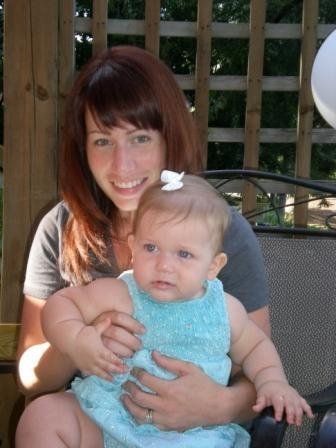Tina Paul is one of those women. At just 28 years of age, she suffered a severe stroke in June 2008. Her daughter was just 8 months old at the time. Here Tina shares what a stroke is really like, how it has impacted her life, and its effect on her role as a mother. What was your health like before the stroke? Before my stroke, I was in great health. I was nursing my 8-month-old daughter at the time. I felt great and was taking good care of myself; I was really surprised after my stroke to learn that strokes can happen at any time to people of all ages — even those in good health. Did you know of anyone in your family who had suffered a stroke before? Was it something you ever worried about? My grandmother on my mother’s side had a stroke about a year and a half after me, but at the time, I was a young, healthy 28-year-old woman, so it was nothing I had ever considered being at risk for. I was completely shocked when it happened. I went through lots of tests, trying to figure out why I had experienced a stroke. All the doctors could find was a small hole in the heart. The theory is that a blood clot got into that hole and caused my stroke. I did decide to have the hole closed. Describe what happened when you had your stroke? Where was your daughter at the time? When my stroke happened it was surreal, perhaps even more so because I remember everything. I had just started a new job and was two weeks into it when I had a stroke at work on a Tuesday morning. My mom was watching Ella while I was at work. I was talking with my boss and suddenly started to feel really weird. My boss immediately realized something wasn’t right and asked me, “What’s wrong, Tina?” But I couldn’t answer. I started to feel really dizzy, and he got me a chair and called 911. I then felt drool dribble down my chin. The next thing I knew, I was in an ambulance. They brought me to a hospital, which was fortunately located only a mile away. I remember being wheeled on a stretcher into the hospital — I could see the blue sky as they wheeled me from the ambulance to the hospital. The doctors did a CT and discovered that I was having a stroke that was caused by a blood clot in my brain, so they rushed me by helicopter to St. Joseph’s Hospital Oakland County, Michigan. By that time, my entire right side was paralyzed and I couldn’t speak. But I was conscious the whole time and felt stunned. All I could do was remain calm and try to stay positive. How long were in you the hospital afterward, and who cared for your daughter while you were there? After my stroke, I spent about two weeks in the hospital and was discharged the day before my 29th birthday. The first night in the hospital was the hardest — I couldn’t see my baby, I could hardly speak, and I had an incredibly strong headache. My daughter stayed with my parents while I recovered. Without them I don’t know what I would have done — having a strong support system really helped my recovery. I was breastfeeding when I had my stroke, which was a big problem when I was in the hospital. I had to have my mom pump for me because I couldn’t use my right hand. It was a learning curve for the staff at the hospital. Here I am 28 and nursing and recovering from a stroke. Suffice it to say, I gave the nurses a big break from the norm. By the time I left, I was able to use my right arm and hand, but I still could not walk. Once you returned home, what were your challenges? Everything was different — my whole life would never be the same again. I had to live with my parents for about a month, which was really hard. I couldn’t hold my baby, and I had a hard time dressing her and myself, and changing diapers. The biggest impact from the stroke was to my right leg. I could not walk by myself or even wiggle my toes. According to the American Heart Association, stroke is a leading cause of serious, long-term disability — and my inability to walk made it impossible to do most physical things with my daughter. Until recently, I couldn’t even kneel down to play with her or take her on a walk, because of my limited mobility. How have you overcome them? I worked hard in therapy and was able to walk well enough to go back to work in September 2008 (with a walker). I kept up with hard work, and by Christmas, I was free from a cane! I got my license back in April 2009. One piece of technology has had the biggest impact: the NESS L300. Basically it has allowed me to walk again. It gives my leg’s muscles the ability to move and the exercise that I can’t otherwise get because of the paralysis issues in my leg. It’s a device designed to help those suffering from mobility issues, specifically those who suffer from “foot drop” — difficulty raising the front part of the foot. This happens to some people who suffer a stroke, but also to those who have multiple sclerosis and other conditions. It stimulates the leg to help my balance and increase my walking speed. Within a few months of using it, I improved my walking pattern. I could even crawl around and play with my daughter, and I felt better about myself. What challenges remain? The road to recovery has been full of challenges. Like most moms, I have a hard time trying to find the time to do it all. Balancing my recovery and finding the time to do necessary exercise and keeping up with a 3-year-old has been difficult. However, seeing the gains I have made and being able to play with my daughter has made it all worth it. As I mentioned, before I got the NESS L300, I was unable to carry Ella or really play with her. I’m now able to do more activities, like taking her for walks, playing, and going to places like the zoo. I can carry her around and can kneel down on the living room carpet with her while she plays — things I never thought I’d be able to do again. I am just now starting to feel like me again, like every other young mom. Do you fear suffering another stroke? Are you at greater risk for another one? According to the American Heart Association, each year about 55,000 more women than men have a stroke. So I know that I am at risk for having another one. That being said, I greatly decrease my chances by not smoking, not drinking too much, regular exercise, and a healthy diet. Are there things you are teaching/will teach your daughter to hopefully help it from happening to her? Ella is still so young that right now I just feed her healthy foods and keep us both active. Luckily the stroke I suffered from is not genetic, so it should not happen to Ella. The most important thing I believe is to teach Ella how to cope with changes and obstacles in life. We will do our best to stay healthy and be positive. What’s the most important thing you’ve learned on this journey? That having a stroke is not the end of the world. If you work hard and think positive, you can overcome anything! Do you know anyone who has suffered from a stroke? Photo via Tina Young

